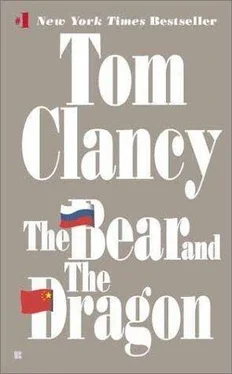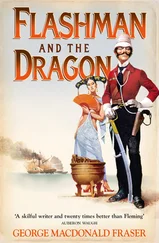Tom Clancy - The Bear and the Dragon
Здесь есть возможность читать онлайн «Tom Clancy - The Bear and the Dragon» весь текст электронной книги совершенно бесплатно (целиком полную версию без сокращений). В некоторых случаях можно слушать аудио, скачать через торрент в формате fb2 и присутствует краткое содержание. Год выпуска: 2001, ISBN: 2001, Жанр: Триллер, на английском языке. Описание произведения, (предисловие) а так же отзывы посетителей доступны на портале библиотеки ЛибКат.
- Название:The Bear and the Dragon
- Автор:
- Жанр:
- Год:2001
- ISBN:780425180969
- Рейтинг книги:3 / 5. Голосов: 1
-
Избранное:Добавить в избранное
- Отзывы:
-
Ваша оценка:
- 60
- 1
- 2
- 3
- 4
- 5
The Bear and the Dragon: краткое содержание, описание и аннотация
Предлагаем к чтению аннотацию, описание, краткое содержание или предисловие (зависит от того, что написал сам автор книги «The Bear and the Dragon»). Если вы не нашли необходимую информацию о книге — напишите в комментариях, мы постараемся отыскать её.
The Bear and the Dragon — читать онлайн бесплатно полную книгу (весь текст) целиком
Ниже представлен текст книги, разбитый по страницам. Система сохранения места последней прочитанной страницы, позволяет с удобством читать онлайн бесплатно книгу «The Bear and the Dragon», без необходимости каждый раз заново искать на чём Вы остановились. Поставьте закладку, и сможете в любой момент перейти на страницу, на которой закончили чтение.
Интервал:
Закладка:
“But what?” Bondarenko demanded.
“But isn’t it better to let them come in with minimal interference for a few days?” It was a courageous thing for his operations officer to say. It was also the right thing, Gennady Iosifovich realized on reflection. If his only strategic option was to lay a deep trap, then why waste what assets he had before the trap was fully set? This was not the Western Front in June of 1941, and he didn’t have Stalin sitting in Moscow with a figurative pistol to his head.
No, in Moscow now, the government would be raising all manner of political hell, probably calling for an emergency meeting of the United Nations Security Council, but that was just advertising. It was his job to defeat these yellow barbarians, and doing that was a matter of using what power he had in the most efficient manner possible, and that meant drawing them out. It meant making their commander as confident as a schoolyard bully looking down at a child five years his junior. It meant giving them what the Japanese had once called the Victory Disease. Make them feel invincible, and then leap at them like a tiger dropping from a tree.
“Andrey, only a few aircraft, and tell them not to risk themselves by pressing their attacks too hard. We can hurt their air force, but their ground forces-we let them keep their advantage for a while. Let them get fat on this fine table set before them for a while.”
“I agree, Comrade General. It’s a hard pill to swallow, but in the end, harder for them to eat-assuming our political leadership allows us to do the right thing.”
“Yes, that is the real issue at hand, isn’t it?”
CHAPTER 52 Deep Battle
General Peng crossed over into Russia in his command vehicle, well behind the first regiment of heavy tanks. He thought of using a helicopter, but his operations staff warned him that the air battle was not going as well as the featherheads in the PLAAF had told him to expect. He felt uneasy, crossing the river in an armored vehicle on a floating bridge-like a brick tied to a balloon-but he did so, listening as his operations officer briefed him on the progress to this point.
“The Americans have surged a number of fighter aircraft forward, and along with them their E-3 airborne radar fighter-control aircraft. These are formidable, and difficult to counter, though our air force colleagues say that they have tactics to deal with them. I will believe that when I see it,” Colonel Wa observed. “But that is the only bad news so far. We are several hours ahead of schedule. Russian resistance is lighter than I expected. The prisoners we’ve taken are very disheartened at their lack of support.”
“Is that a fact?” Peng asked, as they left the ribbon bridge and thumped down on Russian soil.
“Yes, we have ten men captured from their defensive positions-we’ ll see them in a few minutes. They had escape tunnels and personnel carriers set to evacuate the men. They didn’t expect to hold for long,” Colonel Wa went on. “They planned to run away, rather than defend to the last as we expected. I think they lack the heart for combat, Comrade General.”
That information got Peng’s attention. It was important to know the fighting spirit of one’s enemy: “Did any of them stand and fight to the end?”
“Only one of their bunker positions. It cost us thirty men, but we took them out. Perhaps their escape vehicle was destroyed and they had no choice,” the colonel speculated.
“I want to see one of these positions at once,” Peng ordered.
“Of course, Comrade General.” Wa ducked inside and shouted an order to the track driver. The Type 90 armored personnel carrier lurched to the right, surprising the MP who was trying to do traffic control, but he didn’t object. The four tall radio whips told him what sort of track this was. The command carrier moved off the beaten track directly toward an intact Russian bunker.
General Peng got out, ducking his head as he did so, and walked toward the mainly intact old gun turret. The “inverted frying pan” shape told him that this was off an old Stalin-3 tank-a very formidable vehicle, once upon a time, but now an obvious relic. A team of intelligence specialists was there. They snapped to attention when they saw the general approach.
“What did we kill it with?” Peng asked.
“We didn’t, Comrade General. They abandoned it after firing fifteen cannon shots and about three hundred machine gun rounds. They didn’t even destroy it before we captured it,” the intelligence captain reported, waving the general down the tank hatch. “It’s safe. We checked for booby traps.”
Peng climbed down. He saw what appeared to be a comfortable small barracks, shell storage for their big tank gun, ample rounds for their two machine guns. There were empty rounds for both types of guns on the floor, along with wrappers for field rations. It appeared to be a comfortable position, with bunks, shower, toilet, and plenty of food storage. Something worth fighting for, the general thought. “How did they leave?” Peng asked.
“This way,” the young captain said, leading him north into the tunnel. “You see, the Russians planned for everything.” The tunnel led under the crest of the hill to a covered parking pad for-probably for a BTR, it looked like, confirmed by the wheel tracks on the ground immediately off the concrete pad.
“How long did they hold?”
“We took the place just less than three hours after our initial bombardment. So, we had infantry surrounding the main gun emplacement, and soon thereafter, they ran away,” the captain told his army commander.
“I see. Good work by our assault infantry.” Then Peng saw that Colonel Wa had brought his command track over the hill to the end of the escape tunnel, allowing him to hop right aboard.
“Now what?” Wa asked.
“I want to see what we did to their artillery support positions.”
Wa nodded and relayed the orders to the track commander. That took fifteen minutes of bouncing and jostling. The fifteen heavy guns were still there, though the two Peng passed had been knocked over and destroyed by counter-battery fire. The position they visited was mainly intact, though a number of rockets had fallen close aboard, near enough that three bodies were still lying there untended next to their guns, the bodies surrounded by sticky pools of mainly dried blood. More men had survived, probably. Close to each gun was a two-meter-deep narrow trench lined with concrete that the bombardment hadn’t done more than chip. Close by also was a large ammo-storage bunker with rails on which to move the shells and propellant charges to the guns. The door was open.
“How many rounds did they get off?” he asked.
“No more than ten,” another intelligence officer, this one a major, replied. “Our counter-battery fire was superb here. The Russian battery was fifteen guns, total. One of them got off twenty shots, but that was all. We had them out of action in less than ten minutes. The artillery-tracker radars worked brilliantly, Comrade General.”
Peng nodded agreement. “So it would appear. This emplacement would have been fine twenty or thirty years ago-good protection for the gunners and a fine supply of shells, but they did not anticipate an enemy with the ability to pinpoint their guns so rapidly. If it stands still, Wa, you can kill it.” Peng looked around. “Still, the engineers who sited this position and the other one, they were good. It’s just that this sort of thing is out of date. What were our total casualties?”
“Killed, three hundred fifty, thereabouts. Wounded, six hundred twenty,” operations replied. “It was not exactly cheap, but less than we expected. If the Russians had stood and fought, it could have been far worse.”
Читать дальшеИнтервал:
Закладка:
Похожие книги на «The Bear and the Dragon»
Представляем Вашему вниманию похожие книги на «The Bear and the Dragon» списком для выбора. Мы отобрали схожую по названию и смыслу литературу в надежде предоставить читателям больше вариантов отыскать новые, интересные, ещё непрочитанные произведения.
Обсуждение, отзывы о книге «The Bear and the Dragon» и просто собственные мнения читателей. Оставьте ваши комментарии, напишите, что Вы думаете о произведении, его смысле или главных героях. Укажите что конкретно понравилось, а что нет, и почему Вы так считаете.






![Александр Ирвин - Tom Clancy’s The Division 2. Фальшивый рассвет [litres]](/books/417744/aleksandr-irvin-tom-clancy-s-the-division-2-falsh-thumb.webp)




